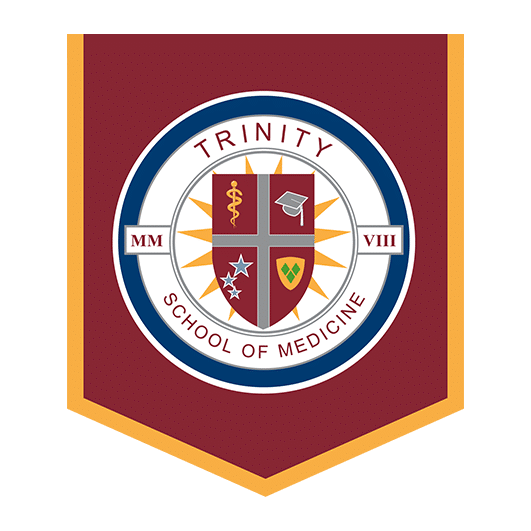Students, applicants, and pre-meds that we’ve talked to over the past year have heard about Trinity moving forward with Medical Board of California (MBC) approval process. Given Trinity’s ever-growing list of international recognition, accreditation, and approvals, the time was right to take this next step for our students.
What Is The MBC Approval Process?
For those unaware, until recently, California state law dictates that the MBC must independently evaluate and approve each individual foreign medical school. Only after this evaluation is complete and approval is granted, can medical students apply for residency and licensure. It is considered the highest bar to clear in state medical board approvals, and a little over a dozen other US states follow the MBC’s decision. (It’s worth mentioning that many of these states have opted to independently approve Trinity despite our unevaluated status).
This law has been a major concern for the thousands of qualified students considering going abroad for their medical education. Its existence has left them wondering about their ability to practice medicine in a number of states, be it California itself, or states following California’s lead.
New California Legislation
California governor Jerry Brown signed California SB-798 into law on October 13th, 2017. This legislation repeals the law mandating the MBC’s independent evaluation process for the state of California effective January 1, 2020, provided schools meet other extant accreditation and quality standards, specifically stating the 2023 ECFMG mandate as the key qualifying criteria:
- “The foreign medical school has been evaluated by the Educational Commission for Foreign Medical Graduates (ECFMG) or one of the ECFMG-authorized foreign medical school accreditation agencies and deemed to meet the minimum requirements substantially equivalent to the requirements of medical schools accredited by the Liaison Committee on Medical Education, the Committee on Accreditation of Canadian Medical Schools, or the Commission on Osteopathic College Accreditation.”
- “The foreign medical school is listed on the World Federation for Medical Education (WFME) and the Foundation for Advancement of International Medical Education and Research (FAIMER) World Directory of Medical Schools joint directory or the World Directory of Medical Schools.”
For a foreign medical school to qualify under either of the two paragraphs above, a current listing in the W.H.O directory alone will not be valid enough if you want to have clerkships, residency, or licensure in the United States in 2023 or in California in 2020. The country where the medical school resides must have accreditation standards recognized by the ECFMG (which is handled by the US Department of Education’s NCFMEA) or the WFME as substantially equivalent to the LCME in the United States, and the medical school must be accredited by one of the approved accrediting bodies on the ECFMG or the WFME website.
Trinity School of Medicine is accredited by CAAM-HP, one of the recognized accrediting bodies of the ECFMG and WFME. St. Vincent and the Grenadines is approved by the NCFMEA arm of the US Department of Education as having accrediting standards for medical schools that are equivalent to the LCME standards of the United States. St. Vincent and the Grenadines adopted the CAAM-HP accrediting standards for all accredited medical schools several years ago. Currently, Trinity School of Medicine is the only accredited medical school in St. Vincent and the Grenadines.
So What Does This Approval Process Mean for Trinity?
Simply put, Trinity School of Medicine currently meets or exceeds each of California’s new requirements (pg. 308) for automatic state medical board approval.
As such, on January 1, 2020, Trinity School of Medicine graduates can match into California residencies as well as apply for medical licensure in California. Since we qualify for the 2020 standards, it is no longer necessary for Trinity to be approved by the MBC.
Also of note in the legislation, every medical school graduate seeking licensure to practice in California must now have 36 months of post-graduate training at ACGME affiliated residency programs; this includes graduates of US, Canadian, and international medical schools. (Previously, graduates of US schools only needed one year, and international graduates needed two). All medical students will now be treated equally! Also, postgraduate programs approved by the College of Family Physicians of Canada (CFPC) are now also considered valid for licensure request, creating a new path to practice in California for Trinity’s Canadian graduates who went home for their residency training.
A common question is, “Why did the Medical Board of California decide to change this?” The board’s response to the law is available here (their support of the decision is outlined on page 34).
What about States that Follow California?
There are several states that follow MBC decisions, approving or disapproving schools based on California’s findings. Most of these states already have an alternative approval process in place or will be creating one. As an example, the Medical Licensing Board of Indiana has already evaluated Trinity independently and approved Trinity even though they follow the California approval list. We suspect that most if not all states that follow California will adopt similar legislation once they have a chance to review the ECFMG mandate as California did. Most states cannot provide such an in-depth accrediting review and/or approval process compared to what is already in place with the 2023 mandate from the ECFMG. So far, there have been no major comments from other state medical boards.
We have celebrated each success as Trinity grows in recognition and reputation around the world as an institution dedicated to the quality of its education and the strength and character of its students. For the state of California to recognize the work achieved by the medical schools that already meet the 2023 standards by allowing them to be approved in 2020 is very gratifying. What pleases us, even more, is that this new legislation will automatically qualify our students for residency and state licensure in California upon graduation going forward. As we remain committed to our goal of “study here, practice anywhere”, we do so with renewed confidence, energy, and excitement for what this means for our graduates, and the ever-growing opportunities we can provide.

